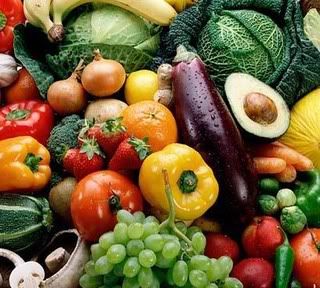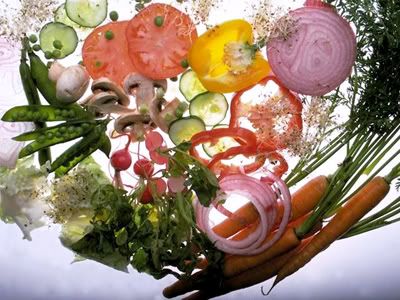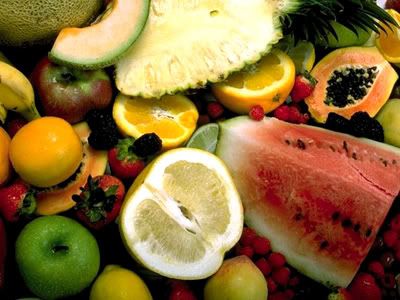----------------- Bulletin Message -----------------
From: B Mac Zilla!
Date: Aug 13, 2008 6:18 PM
----------------- Bulletin Message -----------------
From: Antakaranah
Date: Aug 13, 2008 5:41 PM
As of today, my mother is cancer free. Several months ago she was diagnosed with an aggressive form of ovarian cancer. Not only did the doctor say she would be pretty much dead by now, he also said "If you want to be alive this christmas you will do chemo". Well she didn't. Instead she went on raw food and applied wholistic practices. Now like thousands of others in this country, she has cured herself through living and raw foods. It's a beautiful day.
Antakaranah
----------------- Bulletin Message -----------------
From: • jim •
Date: Aug 13, 2008 5:25 PM
Trippingbillys
----------------- Bulletin Message -----------------
From: Delly Doolittle ♥ Respect Life*Go Vegan
Date: Aug 13, 2008 5:08 PM
From: ♥ AmberZo ♥ (GoVegan)
~♥~
Let your food be your medicine
You are what you eat, so eat well and be well :o)

Love & light to:
Perseverando
Kindness of Strangers E_CO Member
♥ Linda ♥ love animals - don't eat them!
Tips For Reducing High Blood Pressure

Solution to getting your blood pressure down and off of medication - Go vegetarian or vegan
Multiple studies confirm that the incidence of high blood pressure in meat-eaters compared to that in vegetarians is nearly triple and the incidence of very high blood pressure in meat-eaters compared to that in vegetarians is 13 times higher! The rate of substantial improvement in patients with high blood pressure by switching to a vegetarian diet is an astounding 30 to 75 percent - The number of patients with high blood pressure who are able to completely discontinue the use of medications after adopting a low-sodium, low-fat, high-fiber vegetarian diet is 58 percent - Most remarkable of all is that the incidence of high blood pressure among senior citizens in countries eating traditional low-fat plant-based diets is virtually zero!
Vegetarian Diet
Vegetarians, in general, have lower blood pressure levels and a lower incidence of hypertension and other cardiovascular diseases - Experts postulate that a typical vegetarian's diet contains more potassium, complex carbohydrates, polyunsaturated fat, fiber, calcium, magnesium, vitamin C and vitamin A, all of which may have a favorable influence on blood pressure
Sugar
Sucrose, common table sugar, elevates blood pressure - Take a diet that is rich in high potassium foods (vegetables and fruits) and essential fatty acids - Daily intake of potassium should total 7 grams per day - The diet should be low in saturated fat, sugar and salt - In general, a whole food diet emphasizing vegetables and members of the garlic/onion family should be consumed
Reduce Salt and Sodium in Your Diet
A key to healthy eating is choosing foods lower in salt and sodium - Before the widespread availability of medication to control high blood pressure, people with serious hypertension had only one treatment option, a drastically salt-reduced, low-calorie "rice diet" - Some people can significantly lower their blood pressure by avoiding salt
Excessive consumption of dietary sodium chloride (salt), coupled with diminished dietary potassium, induces an increase in fluid volume and an impairment of blood pressure regulating mechanisms - This results in hypertension in susceptible individuals
A high potassium-low sodium diet reduces the rise in blood pressure during mental stress by reducing the blood vessel constricting effect of adrenaline - Sodium restriction alone does not improve blood pressure control; it must be accompanied by a high potassium intake - Most of us consume more salt than we need
Fiber
A high-fiber diet has been shown to be effective in preventing and treating many forms of cardiovascular disease, including hypertension
The types of dietary fiber is important - Of the greatest benefit to hypertension are the water soluble gel-forming fibers such as oat bran, apple pectin, psyllium seeds, and guar gum - These fibers, in addition to be of benefit against hypertension, are also useful to reduce cholesterol levels, promote weight loss, chelate out heavy metals, etc
Take one to three tablespoons of herbal bulking formula containing such things as oat fiber, guar gum, apple pectin, gum karaya, psyllium seed, dandelion root powder, ginger root powder, fenugreek seed powder and fennel seed powder
Foods To Fight High Blood Pressure
Nutritionists believe that food is a natural pharmacy and that the answer to a lot of our health problems lies in what we eat
1) Celery (Apium graveolens) Oriental Medicine practitioners have long used celery for lowering high blood pressure - There are some experimental evidence that shows that celery is useful for this - In one study, eating as few as four celery stalks was found to be beneficial in lowering blood pressure in human beings
2) Garlic (Allium sativum) Garlic is a wonder drug for heart - It has beneficial effects in all cardiovascular system including blood pressure - In a study, when people with high blood pressure were given one clove of garlic a day for 12 weeks, their diastolic blood pressure and cholesterol levels were significantly reduced - Eating quantities as small as one clove of garlic a day was found to have beneficial effects on managing hypertension - Use garlic in your cooking, salad, soup, pickles, etc - It is very versatile
3) Onion (Allium cepa) Onions are useful in hypertension - What is best is the onion essential oil - Two to three tablespoons of onion essential oil a day was found to lower the systolic levels by an average of 25 points and the diastolic levels by 15 points in hypertension subjects - This should not be surprising because onion is a cousin of garlic
4) Tomato (Lycopersicon lycopersicum) Tomatoes are high in gamma-amino butyric acid (GABA), a compound that can help bring down blood pressure
5) Broccoli (Brassica oleracea) This vegetable contains several active ingredients that reduce blood pressure
6) Carrot (Daucus carota) Carrots also contain several compounds that lower blood pressure
7) Saffron (Crocus sativus) Saffron contains a chemical called crocetin that lowers the blood pressure - You can use saffron in your cooking - (It is a very popular spice in Arabic cooking) You can also make a tea with it - Many Indians add a pinch of saffron in the brewed tea to give a heavenly flavor - Unfortunately, it is very expensive
8) Assorted spices
Spices such as fennel, oregano, black pepper, basil and tarragon have active ingredients that is beneficial in hypertension - Use them in your cooking
9) Soya Beans
Soya beans are believed to reduce levels of harmful blood fats involved in heart diseases, regulate the bowls, stabilise blood sugar levels and combat breast cancer - *Studies have shown that participants drinking soy milk had a significantly greater fall in both systolic and diastolic blood pressure, compared with those drinking cow's milk
10) Oats
Oats are an excellent source of helping to lower blood pressure and sugar levels - The soluble fibre in oats also helps to remove bile acids involved in the formation of cholesterol
11)Tea
Scientists have discovered that tea has an abundance of phytonutrients, also found in fruit and vegetables, which are antioxidants that defend against cell damage that leads to ageing and diseases such as diabetes, cataracts, heart disease and cancer - The antioxidant activity of tea is more powerful than that found in most fruit and vegetables
12) Omega-3 & Omega-6 Fatty Acids These are found in vegetable oils, nuts, seeds and grains ( flax seeds, sunflower seeds, walnuts, etc)
*Fish does contain omega-3 fatty acids - but - fish is also nutrient-poor and often contaminated with pollution, pesticides, hormones, and drugs - *Omega-3 Fats do not come from fish (they don't produce it) *Omega-3 Fat comes from algae (fish eat the algae as part of their diet) - We can of course eat the algae ourselves (spare the fish their lives) - Chlorella and spirulina provide valuable sources of these converted fats as well as a whole host of other nutrients - Besides fish contains mercury and other toxic contaminates - not things you want in your body
Increased Blood Pressure: a diet high in fat causes thickened blood and blocked arteries increasing the likelihood of cardiovascular disease and other degenerative diseases - According to the American Heart Association: Eating too much saturated fat (meat) can raise your blood cholesterol level, which increases the risk of coronary artery disease (clogged arteries) and heart attack - Plant foods contain no cholesterol - Even lean meats like shrimp and white chicken meat are high in cholesterol
Tips for reducing your blood pressure:
If your blood pressure is high, reducing your sodium intake is a small lifestyle change that can have a big impact - Other critical measures you take include:
* Losing weight (if you're overweight or obese)
* Limiting alcohol intake
* Limiting saturated fat in your diet
* Adding more fruits and vegetables to your diet
* Increasing your intake of calcium, magnesium and potassium
* Getting regular exercise
* Reduce Stress (meditate, do yoga, listen to peaceful music)
* Reduce Salt intake (most cheese contains large amounts of sodium)
By: The Physicians Committee for Responsible Medicine
The food you eat plays a crucial role in your health. Certain foods can even help in the prevention and treatment of diabetes. In diabetes, the cells of the body cannot get the sugar they need. Glucose, a simple sugar, is the body's main fuel. It is present in the blood even if you don't eat any sugary foods, because the foods we eat are broken down into glucose. A hormone called insulin signals the body's cells to let glucose in. In people with diabetes, glucose cannot get into the cells where it is needed..
Low-fat, fiber-rich diets built from legumes, vegetables, whole grains, and fruits help individuals avoid diabetes and control blood sugar levels - Such diets can also prevent complications in people who already have diabetes
Choosing the right foods can make a world of difference to your health - Look for delicious, minimally processed foods from plant sources - Here are ten tasty choices for the prevention and management of diabetes:
1) Mixed Greens with Apples and Walnuts — This low glycemic index fruit is a great choice, along with fresh apricots, peaches, and pears. The glycemic index (GI) is a measure of how quickly a food releases its sugars. Foods with low GI raise blood sugar levels more slowly than high-GI foods. It's helpful to raise blood sugar slowly so that your body can properly remove them from the blood. Walnuts are high in important omega-3 fatty acids, which do not adversely affect glycemic control, unlike the saturated fats found in meats and cheeses. Omega-3 fatty acids also help keep your heart healthy by decreasing triglyceride levels in the blood and reducing the risk of fatal cardiac events..
2) Steamed Artichokes — Serve this beautiful vegetable upright on a plate with rice wine vinegar as a dipping sauce. Artichokes are low in calories, nearly fat free, and delicious. They're also rich in fiber, which slows down the absorption of natural sugars from the starchy foods we eat and has been shown to reduce insulin resistance..
3) Hummus Dip with Baby Carrots — Hummus is a hearty dip made from chickpeas, sesame seed paste, garlic, and lemon. Chickpeas provide protein and fiber, while sesame seeds are a great source of vitamin E. Vitamin E is an antioxidant that can help protect and improve circulation in the eyes. Use carrots to dip with and get double the eye- and anti-oxidant protection from the beta-carotene in the carrots. People with diabetes frequently develop eye problems, particularly diabetic retinopathy, or damage to the retina. This can lead to a gradual loss of vision..
4) Old-Fashioned or Irish Oats with Fresh Strawberries — Here's a breakfast that fills you up without filling you out. It's also a good source of vitamin C, vitamin B6, and soluble fiber. Vitamin C is an antioxidant and a potent eye protector, while vitamin B6 may help prevent diabetic retinopathy (retina damage). Soluble fiber, in addition to helping keep blood sugar under control, can help lower blood cholesterol levels. People at risk for diabetes—and those already coping with it—have a high risk for heart disease. Therefore, it's important to choose meals that decrease cholesterol levels..
5) Quinoa Tabouli — This protein-rich whole grain can help head off those carbohydrate cravings with a healthy choice. Some individuals crave muffins, cookies, cakes, and white bread—all foods that raise blood sugar levels unnecessarily. Tasty and healthier whole-grain foods can satisfy the need for carbohydrates..
6) Mushroom Barley Soup — Barley has the lowest glycemic index of any grain, and mushrooms are tasty and magnesium-rich - Magnesium helps maintain nerve cells and may also play a role in preventing diabetic retinopathy (retina damage)
7) Edamame (boiled fresh soybeans in the pod) — A delicious, hearty, protein- and fiber-rich snack that is fun to eat and chock-full of disease-fighting phytosterols (a plant compound that can lower cholesterol, among other things). Look for fresh edamame at your local farmer's market, or check the frozen vegetable case in the supermarket. Most kids love them..
8) Fruity Spinach Salad — An attractive salad decorated with sunflower seeds, oranges, sweet red pepper, and cucumbers and flavored with raspberry vinaigrette fat-free dressing makes a delicious first course or side dish. Spinach is great for magnesium; sunflower seeds provide vitamin E, selenium, and magnesium; and oranges and red peppers are good sources of vitamin C. Selenium is an important antioxidant. This mineral protects the cells of the heart and blood vessels from damage, which is important because of diabetes' strong association with heart disease..
9) Curried Cauliflower and Peas — This dish is low in fat, high in potassium (which lowers blood pressure), rich in disease-fighting phytochemicals, and high in flavor - Serve it as a main dish with brown rice and a side salad for a simple but delicious meal
10) Basmati and Wild Rice Pilaf — Whole grains and nuts are good sources of chromium. Chromium works with the hormone insulin to get glucose into the cells, where we can use it for energy. A deficiency in chromium can lead to high blood glucose levels. Chronically high blood sugar levels damage the body, especially the eyes, kidneys, and nerves..

It's simple - Don't eat meat! Meat contains cholesterol!
There is no nutritional need for humans to eat any animal products; all of our dietary needs, even as infants and children, are best supplied by an animal-free diet. Our evolutionary ancestors were, and our closest primate relatives are, vegetarians. Human teeth and intestines are designed for eating and digesting plant foods, so it is no wonder that our major health problems can be traced to meat consumption..

Plant foods contain no cholesterol!
Heart researchers have found that a vegan (pure vegetarian) diet is the best for lowering cholesterol levels. Plant foods contain no cholesterol, whereas meats, eggs, and dairy products contain large amounts of cholesterol, saturated fats, and concentrated protein—all harmful substances. In contrast, soy protein has been proved to lower cholesterol, and the high fiber content of a vegetarian diet helps eliminate excess cholesterol from your digestive tract (meat, dairy products, and eggs have no fiber at all)..
An animal based diet is not only
unhealthy and dangerous for humans,
but extremely cruel for the animals

























 اخبار مربوط به زندانیان سیاسی و نقض حقوق بشر
اخبار مربوط به زندانیان سیاسی و نقض حقوق بشر

















 Tulips in Holland
Tulips in Holland












No comments:
Post a Comment